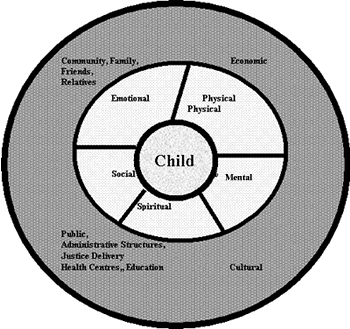|
Back to Index
Psychosocial
support key to fulfillment of children's rights
Child
Protection Society (CPS)
Extracted from the Child Advocate Newsletter, Issue No. 3
December 2003
Psychosocial
support (PSS) has been recognized as the most holistic approach
towards fulfilling the rights of children affected by HIV and AIDS,
a PSS advocacy workshop recommended recently.
The workshop,
attended by 20 participants from East and Southern Africa, noted
that most non governmental organisations (NGOs) and Community Based
Organisations (CBOs) who were involved in programs that address
the rights of children, concentrated on providing material such
as education assistance, health and nutrition projects. Where Early
Childhood and Care services were offered, the major aim was to provide
at least a meal a day to the children.
However some
children who were receiving these services were not achieving self
reliance because of other unfulfilled rights. Providing psychosocial
support for children helps to meet the children’s social, mental,
physical and emotional needs.
"PSS begins
with recognizing the strength and resilience in the child affected
by HIV/Aids," said Ms Doreen Mukwena, the director of the Child
Protection Society. "Most people associated the word orphan
with negative statements such as poor, needy, helpless, depressed,"
Ms Mukwena said, adding "But these children should be affirmed
as determined survivors, who have experienced extreme grief and
pain, but still live on".
Ms Mukwena was
one of the participants to the psychosocial support (PSS) advocacy
workshop held for the partners of the Regional Psychosocial support
Initiative (REPSSI) in Johannesburg, in early September, 2003.
PSS a community
responsibility
PSS
provision, the workshop agreed, depends largely on communities that
view themselves as duty bearers, responsible for providing support
to all children as rights holders particularly orphans and vulnerable
children (OVC). All functionaries in the community, from the extended
family, neighbours community based groups, churches, schools, hospitals
and other institutions have a contribution to make.
Children as
part of the community, are key participants in providing PSS to
each other. PSS approaches recognize children as social actors who
can participate in issues that affect them. Contrary to this thinking,
communities view children as "helpless victims who are fully
reliant on adults for their well being giving way to tremendous
negative long term consequences", according to the REPSSI media
pack.
The benefits
of PSS
At
the closure of the workshop, the participants highly recommended
that PSS should be mainstreamed at organizational level and in all
programming. Mainstreaming PSS would assist organisations in developing
indicators for standards of care that seek to fulfill the psychosocial
rights of the children.
The benefits
of PSS are immense. While children confront their problems and deal
with them, PSS helps them to strengthen mind and body, and develop
coping strategies for overcoming life’s challenges such as depression
and loneliness, grief, hunger, poverty, stigma and discrimination.
As a holistic approach to supporting children to overcome the trauma
caused by HIV and AIDS PSS will harness the vulnerable human capital
which would otherwise waste away in the streets and result in traumatized
adults and a dysfuncinal society. It is however important to realize
that the strength of PSS lies in its holistic nature and the wheel
*below illustrates the interdependence of the element of PSS:
 
Figure
1
The elements in the wheel express the core principles of the Convention
on the Rights of the Child which are: Non-discrimination; Life,
Survival and Development; Participation and The best of the child.
Psychosocial Support for children affected by AIDS is therefore
a right.
The elements
in the wheel express the core principles of the Convention on the
Rights of the Child which are: Non-discrimination; Life, Survival
and Development; Participation and The best of the child. Psychosocial
Support for children affected by AIDS is therefore a right.
Visit the Child
Protection Society fact
sheet
Please credit www.kubatana.net if you make use of material from this website.
This work is licensed under a Creative Commons License unless stated otherwise.
TOP
|

